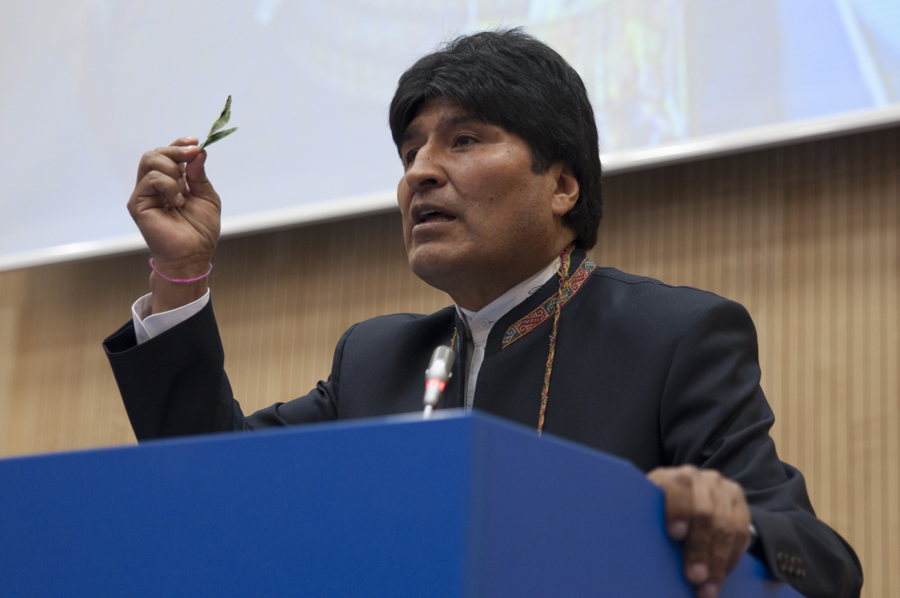Solidarity With Evo Morales
Bolivia is the poorest nation in South America, but it closed 2018 with the highest GDP growth in all of Latin America in 2018.
Did it achieve this growth through neoliberal reforms, such as opening its natural gas and lithium reserves to international firms so Western shareholders could reap the benefits of Bolivia’s wealth in natural resources?
No, instead it had a left-wing president, Evo Morales, who for the past decade has led Bolivia to over 4.2% GDP growth while the rest of South America achieved only 1.2% growth, according to the International Monetary Fund.
Now, the nation of Bolivia stands in intense national strife, with indigenous activists threatening civil war over an alleged coup d’etat against Morales. What happened?
In October of this year, Morales sought a fourth term. What made this move controversial was that Morales was the first indigenous president in a country that is majority indigenous and that he had sought to avoid term limits in a national referendum in 2016, but lost the vote by 51.3% to 48.7% (less than than the Brexit referendum that same year).
The Morales Administration then appealed to the Supreme Tribunal of Justice to challenge the result of the referendum. The Tribunal, with justices elected directly by the people, repealed term limits saying that they infringed on Morales’ human rights to run for a fourth term, citing the American Convention on Human Rights.
Now, if this sounds absurd, just remember how absurd the 2000 United States presidential election sounded to an outside observer. There was no clear victor to that election thanks to “hanging chads” in Florida, and the Supreme Court ruled that the recount there violated the Equal Protection Clause of the Constitution.
The Supreme Court had no place in deciding in election rulings where the state government of Florida had supreme jurisdiction, according to Article 1, Section 4 of the U.S. Constitution, which places state governments, and not the Supreme Court, in charge of administering federal elections. This gave the electoral victory to President George W. Bush, while if there had been a full statewide recount of ballots would have been given to Vice President Al Gore.
Email records also show that Gov. Jeb Bush, George’s brother, thanked future Chief Justice John Roberts for his “input on (his) role in this unique and historic situation” and “recused himself from any involvement in what happened after Nov. 7, 2001, (but) he did not recuse from his role as a brother,” according to the Des Moines Register.
Now, imagine if Morales’ brother had thrown the election in favor of his brother in violation of the Bolivian constitution. The entire Western world would be calling for Morales’ resignation.
Luckily, the West didn’t need such a brazen violation of the constitution to call for a coup. Instead, the West, through the front Organization of American States, alleged that there was electoral fraud in the October general election. It claimed that because there was a pause in the unofficial quick count of votes, the Morales administration tampered results to give Morales the needed 10% margin of victory to avoid a runoff election.
With the trend that the votes were headed, the fact that the remaining votes to be counted came from rural areas that form the base of Morales’ support and that the official counting of ballots never stopped meant that tampering was unlikely.
That didn’t stop the immediate claims of electoral fraud from the right-wing opposition, which took to the streets to dispute the claims of the election. Fueled by reports from organizations like the Organization of American States, which takes over $50 million of its $85 million budget from the United States, the Bolivian right wing felt empowered enough to depose Morales through the military.
Make no mistake, when the military requests that the democratically elected leader of a country step down, and that leader complies for fear of his life and takes asylum in another country, that is a military coup. Anyone who says otherwise is either being willfully obtuse about the meaning of a military coup or the history of U.S.-backed military coups in Latin America.
This doesn’t even acknowledge that the now “interim” president of Bolivia, Jeanine Añez Chavez, declared herself president without a quorum in the Bolivian Parliament, wished for a Bolivia free from “satanic indigenous rituals,” marched into the Presidential Palace claiming that “the Bible had returned to the Palace” or had basically issued a license to kill to the military to put down protests from Morales-supporting demonstrators.
While Morales has not been a perfect leader, to see Bolivia come under the violent leadership of a right-wing Christian fundamentalist with support from the military and the ideological backing of a U.S.-funded organization should be seen as a loss for democracy worldwide. Americans who would rather debate whether Morales made the right decision to run for a fourth term ignore the fact that the indigenous of Bolivia are dying as they read this column and ignore that their government supports this bloodshed.
Jack McClatchy, FCRH ’21, is a political science major from Wayne, Penn.








































































































































































































